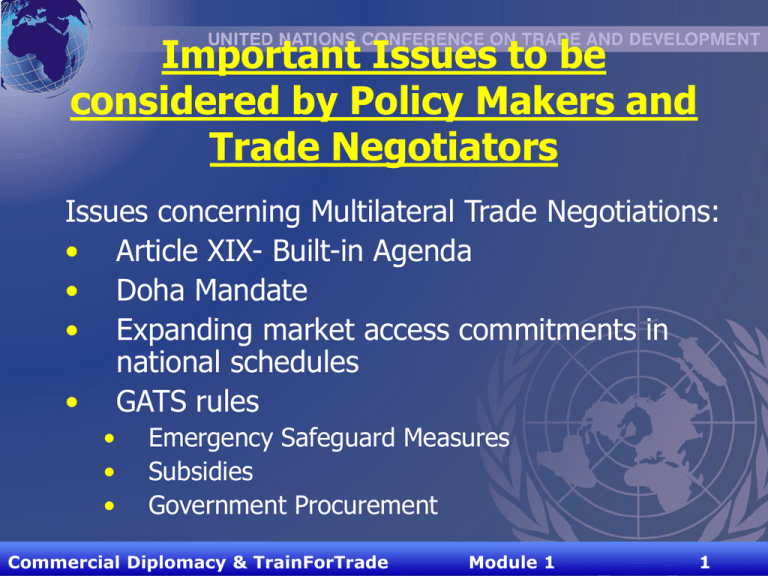Important Issues to be considered by Policy Makers and Trade Negotiators
advertisement

Important Issues to be considered by Policy Makers and Trade Negotiators Issues concerning Multilateral Trade Negotiations: • Article XIX- Built-in Agenda • Doha Mandate • Expanding market access commitments in national schedules • GATS rules • • • Emergency Safeguard Measures Subsidies Government Procurement Commercial Diplomacy & TrainForTrade UNCTAD/CD-TFT Module 1 1 1 Important Issues to be considered by Policy Makers and Trade Negotiators Key Concepts • Domestic regulatory regimes • Non-tariff nature of barriers to trade in services Commercial Diplomacy & TrainForTrade UNCTAD/CD-TFT Module 1 2 2 Progressive Liberalisation • Importance for developing countries to consolidate a positive agenda for their negotiating objectives. • Key Features of the Proposals made in the Framework of the Positive Agenda: • • • • • Implementation of article VI Liberalisation Mode 4 Positive List Approach Introduction of safeguard provisions Revisions of Subsidies and Government Procurement • Reinforcement of Article IX • Credit for autonomous liberalization Commercial Diplomacy & TrainForTrade UNCTAD/CD-TFT Module 1 3 3 SOME STARTING POINTS TO DEFINE THE NEGOTIATING STRATEGY: • Identify the sectors or subsectors where the country has a strong comparative advantage: those are the priorities, where the main negotiating objectives have to be set. • Focus on markets which offer growth prospects for exporters, and determine if a better market access could be achieved with bilateral, subregional or multilateral negotiations. Commercial Diplomacy & TrainForTrade UNCTAD/CD-TFT Module 1 4 4 SOME STARTING POINTS TO DEFINE THE NEGOTIATING STRATEGY • Identify the barriers for the domestic exports in those markets: are they determined by governmental measures? • What are the domestic sectors or subsectors that could be included in the offer list as concessions in exchange of the objectives? Commercial Diplomacy & TrainForTrade UNCTAD/CD-TFT Module 1 5 5 REGARDING THE GATS 2000 Assess the implementation of the GATS: • Costs and benefits in terms of : • creation of employment • transfer of technology • new FDI • new exports • new imports • future trends and prospects. Identify if there is a need for new rules in the GATS (i.e. on competition, subsidies, implementation of art.IV) or if the schedules of commitments need to be changed. Commercial Diplomacy & TrainForTrade UNCTAD/CD-TFT Module 1 6 6 REGARDING THE GATS 2000 • Analyse the objectives of other WTO members and their proposals submitted at the WTO before the Seattle Conference, particularly those of developing countries, as well as the implications for the national position. • Identify potential allies (developed or developing countries) in the negotiating process. • Keep an eye on agriculture negotiations: there may be “trade-offs” and links with services in the future. Watch out for possible future links with e-commerce. Commercial Diplomacy & TrainForTrade UNCTAD/CD-TFT Module 1 7 7 AT THE SUBREGIONAL LEVEL • Questions to be discussed among all members of the subregional agreement: • what is the role of trade in services among members? • Are services a key factor in the development strategies of the members? • Are they a key factor in the consolidation of the subregaional agreement? • What provisions should be adopted to foster trade in services among members? Commercial Diplomacy & TrainForTrade UNCTAD/CD-TFT Module 1 8 8 AT THE SUBREGIONAL LEVEL • Questions to be discussed among all members of the subregional agreement: • Costs and benefits of a deeper liberalisation among members vis-a-vis a multilateral liberalisation? • Therefore, what kind of preferential margin for trade in services should be left (if any) in the multilateral negotiations? • There is room for a common position and a common list of offers/requests? Commercial Diplomacy & TrainForTrade UNCTAD/CD-TFT Module 1 9 9 PUT TOGETHER ALL THESE ELEMENTS TO INITIATE • Consultations at the domestic level with the national entrepreneurs involved in services. • Consultations at the subregional level Commercial Diplomacy & TrainForTrade UNCTAD/CD-TFT Module 1 10 10 PUT TOGETHER ALL THESE ELEMENTS TO INITIATE • Consultations in Geneva with other WTO member states. • Establish a mechanism to monitor the GATS 2000 negotiations and to adjust the negotiating strategies during the process. Commercial Diplomacy & TrainForTrade UNCTAD/CD-TFT Module 1 11 11 IMPORTANT IS UES FOR THE MEDIA SOME QUESTIONS TO BE ASKED BY THE MEDIA TO POLICY-MAKERS, TRADE NEGOTIATORS AND PRIVATE SECTOR REPRESENTATIVES: • What are the objectives of the national negotiators in the on-going WTO • negotiations on services? • What kind of domestic service firms are most competitive in the regional and global • markets? • What domestic regulations should be adopted or improved in accordance with the • GATS provisions and integration in the global economy? • What are the domestic policies that could be put in place to support the export of services? Commercial Diplomacy & TrainForTrade UNCTAD/CD-TFT Module 1 12 12

